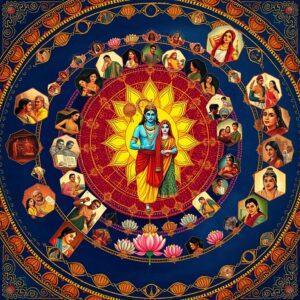
Parshvanatha, revered as the 23rd Tirthankara in Jainism, holds a prominent position in the religion’s history. Recognized as the earliest historical figure among the Jain Tirthankaras, he preceded Mahavira by approximately 250 years. Understanding his birth and early life is crucial to appreciating his contributions to Jain philosophy. This article delves into the details surrounding Parshvanatha’s origin, family, early life, and the key events that shaped his spiritual journey. His life narrative serves as an inspiration for those seeking spiritual growth and a deeper understanding of Jain principles.
Parshvanatha’s Birth and Family
Born in Varanasi around 877 BCE, Parshvanatha entered a world steeped in spiritual significance. This sacred city, known for its rich religious heritage, provided a nurturing environment for his early spiritual development. His birth date, the eleventh day of the dark half of the month of Pausha, is celebrated as Parshvanatha Jayanti.
Parshvanatha hailed from the royal family of the Ikshvaku dynasty, a lineage renowned in Indian history. His father, King Ashvasena, and his mother, Queen Vamadevi, provided him with a privileged upbringing. This royal heritage, combined with the spiritual atmosphere of Varanasi, played a significant role in shaping his character and future path.
Early Life and Spiritual Awakening
From a young age, Parshvanatha displayed a deep sense of compassion and spiritual insight. Accounts of his childhood highlight his inclination towards meditation and his innate connection with the divine. A notable incident involves his intervention to save snakes from a sacrificial fire, demonstrating his commitment to non-violence, a core principle of Jainism.
As he matured, Parshvanatha encountered ascetics and scholars, further nurturing his spiritual growth. These interactions deepened his understanding of the world and its transient nature, eventually leading him towards the path of renunciation.
The Path of Renunciation and Teachings
At the age of 30, Parshvanatha made the profound decision to renounce his royal life and worldly possessions. Driven by a desire for spiritual liberation, he embraced the life of a wandering ascetic. This pivotal moment marked the beginning of his dedicated pursuit of enlightenment.
Parshvanatha’s teachings emphasized the “Fourfold Restraint” (Chaturyama Dharma), which forms the foundation of Jain ethics:
- Ahimsa (Non-violence): The practice of causing no harm to any living being, in thought, word, or deed. This principle extends beyond physical harm to encompass emotional and spiritual well-being.
- Satya (Truthfulness): Adherence to truth in all aspects of life. This involves speaking truthfully, acting honestly, and maintaining integrity in one’s thoughts and intentions.
- Asteya (Non-stealing): Refraining from taking anything that is not freely given. This principle emphasizes respect for the property and possessions of others.
- Aparigraha (Non-possession): Detachment from material possessions and worldly attachments. This principle encourages a simple lifestyle and a focus on spiritual growth over material wealth.
These principles, along with brahmacharya (celibacy), constituted the five great vows for monks.
Legacy and Commemoration
Parshvanatha’s teachings and life story continue to inspire and guide Jain communities worldwide. His legacy is preserved through sacred texts, temples dedicated to his memory, and the annual celebration of Parshvanatha Jayanti. These commemorations serve as a reminder of his profound contributions to Jainism and the enduring relevance of his teachings in contemporary society.
Poojn.in: Your Resource for Jain Rituals and Practices
Poojn.in, India’s leading online store for cultural and religious goods, offers a wide selection of items to support your Jain practices. We provide high-quality products for puja and ceremonies, including:
- Murtis (Idols): Find exquisitely crafted murtis of Bhagwan Parshvanatha in pure silver, brass, and other materials. We offer a variety of sizes and styles to suit your personal preferences and puja room décor.
- Puja Thalis: Our traditional puja thalis are specifically designed for Jain worship, containing all the essential items for performing rituals with reverence and authenticity.
- Sandalwood, Kumkum, and other Puja Essentials: Source authentic sandalwood powder, kumkum, cotton wicks, pure ghee, and other essential items for your puja rituals. All our products are carefully sourced and quality-checked to ensure purity and adherence to Jain principles.
- Flowers, Garlands, and Vastras: Enhance your puja space with fresh flowers, fragrant garlands, and pure cotton vastras (clothing) for the deity. We offer a wide selection to choose from, ensuring you find the perfect offerings for your devotion.
- Incense and Dhoop: Create a serene atmosphere with our range of incense sticks and dhoop made from natural ingredients. Choose from traditional fragrances to enhance your meditation and puja experience.
Explore our collection of Jain puja items and experience the convenience of doorstep delivery across India. Poojn.in is committed to providing high-quality, authentic products that support your spiritual journey.
Also, you can explore other relevant articles on poojn.in:
- Ujjain’s Sacred Sites: A Spiritual Journey Beyond Ganesh
- Hindu Rituals: Essence, Practices, and Meaning Explained


